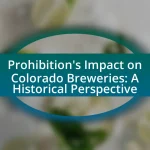The article focuses on notable figures in Colorado’s craft beer history, highlighting key contributors such as Charlie Papazian, Greg Koch, and the founders of New Belgium Brewing. It outlines their significant contributions to the craft beer movement, including innovations in brewing techniques, advocacy for quality standards, and community engagement. The piece also discusses the challenges these pioneers faced in establishing their breweries, the historical events that spurred growth in the industry, and the impact of their efforts on Colorado’s reputation as a leading craft beer destination. Additionally, it examines how their legacies continue to inspire new generations of brewers and the educational initiatives that have emerged from their contributions.
Who are the key figures in Colorado’s craft beer history?
Key figures in Colorado’s craft beer history include Charlie Papazian, who founded the American Homebrewers Association and established the Great American Beer Festival, significantly influencing the craft beer movement. Another important figure is Greg Koch, co-founder of Stone Brewing, who played a vital role in promoting craft beer culture. Additionally, the founders of New Belgium Brewing, Kim Jordan and Jeff Lebesch, are notable for their contributions to the state’s brewing landscape, particularly with their innovative approaches to sustainability and community engagement. These individuals have collectively shaped Colorado into a prominent hub for craft beer, evidenced by the state’s high number of breweries and its reputation for quality brewing.
What contributions did these figures make to the craft beer movement?
Notable figures in Colorado’s craft beer history significantly advanced the craft beer movement through innovation, advocacy, and education. For instance, brewers like Charlie Papazian, founder of the American Homebrewers Association, popularized homebrewing and established the Great American Beer Festival, which showcases craft breweries and fosters community engagement. Additionally, figures such as Greg Koch of Stone Brewing advocated for quality and flavor in beer, influencing industry standards and consumer expectations. Their contributions helped shape a vibrant craft beer culture in Colorado, leading to increased diversity in beer styles and a thriving local economy, evidenced by Colorado ranking among the top states for craft breweries per capita.
How did their innovations shape the brewing landscape in Colorado?
Innovations by notable figures in Colorado’s craft beer history significantly transformed the state’s brewing landscape by introducing diverse brewing techniques and unique flavor profiles. For instance, the establishment of the first craft breweries in the 1980s, such as Boulder Beer Company, pioneered the use of local ingredients and innovative brewing methods, which led to a surge in microbreweries across Colorado. This shift not only diversified the beer offerings but also fostered a culture of experimentation and community engagement, as seen in the rise of collaborative brewing events and festivals. The impact of these innovations is evident in Colorado’s recognition as a leading craft beer destination, with over 400 breweries operating statewide as of 2023, showcasing a wide array of styles and flavors that reflect both local traditions and global influences.
What challenges did they face in establishing their breweries?
They faced significant challenges in establishing their breweries, including regulatory hurdles, financial constraints, and market competition. Regulatory hurdles involved navigating complex licensing requirements and health regulations that varied by locality, which often delayed the opening of new breweries. Financial constraints were prevalent, as securing funding for equipment, ingredients, and operational costs proved difficult, especially for new entrants in a competitive market. Additionally, market competition from established breweries made it challenging for newcomers to gain visibility and attract customers, necessitating innovative marketing strategies and unique product offerings to differentiate themselves.
Why is Colorado considered a significant state in the craft beer industry?
Colorado is considered a significant state in the craft beer industry due to its high number of breweries and its influential role in the craft beer movement. As of 2023, Colorado ranks among the top states in the U.S. for craft breweries per capita, with over 400 breweries operating statewide. This concentration of breweries has fostered a vibrant beer culture, attracting enthusiasts and contributing to the state’s economy. Additionally, Colorado is home to the Great American Beer Festival, one of the largest and most prestigious beer festivals in the country, which showcases the state’s commitment to craft brewing excellence.
What historical events contributed to the growth of craft breweries in Colorado?
The growth of craft breweries in Colorado was significantly influenced by the legalization of homebrewing in 1978, which allowed individuals to experiment with brewing techniques and recipes. This pivotal change led to a surge in interest and innovation within the brewing community. Additionally, the establishment of the Colorado Brewers Guild in 1998 provided a platform for collaboration and support among local brewers, further fostering the craft beer culture. The state’s favorable climate and access to high-quality water also contributed to the development of unique beer styles, enhancing Colorado’s reputation as a craft beer destination.
How has the state’s culture influenced its craft beer scene?
Colorado’s culture has significantly influenced its craft beer scene by fostering a strong sense of community and appreciation for local ingredients. The state’s outdoor lifestyle, characterized by activities such as hiking and skiing, encourages social gatherings where craft beer is often a focal point. Additionally, Colorado’s history of brewing, dating back to the Gold Rush, has cultivated a rich tradition of innovation and experimentation among local brewers. This cultural backdrop is evident in the state’s numerous craft breweries, which prioritize sustainability and local sourcing, reflecting the community’s values. For instance, Colorado ranks among the top states in the U.S. for craft breweries per capita, with over 400 establishments, showcasing the vibrant craft beer culture that thrives on local engagement and creativity.

What are the notable breweries founded by these figures?
Notable breweries founded by significant figures in Colorado’s craft beer history include New Belgium Brewing Company, founded by Jeff Lebesch and Kim Jordan in 1991, and Odell Brewing Company, established by Doug Odell in 1989. Additionally, Avery Brewing Company was founded by Adam Avery in 1993, and Left Hand Brewing Company was started by Eric Wallace and Dick Doore in 1994. These breweries have played a crucial role in shaping Colorado’s craft beer landscape, contributing to its reputation as a leading craft beer state.
How did these breweries impact the local economy?
Breweries significantly impacted the local economy by creating jobs, stimulating tourism, and generating tax revenue. For instance, in Colorado, the craft beer industry contributed over $3 billion to the state’s economy in 2020, supporting more than 20,000 jobs. Additionally, breweries attract visitors, with the Colorado Brewers Guild reporting that craft beer tourism has become a vital part of the state’s economic landscape, further enhancing local businesses such as restaurants and hotels.
What role did community engagement play in their success?
Community engagement was crucial to the success of notable figures in Colorado’s craft beer history, as it fostered strong local support and loyalty. By actively involving the community through events, collaborations, and feedback, these figures created a sense of belonging and ownership among consumers. This engagement not only increased brand visibility but also encouraged word-of-mouth marketing, which is vital in the craft beer industry. For instance, breweries that hosted local festivals or participated in community initiatives often saw a significant boost in patronage, demonstrating the direct correlation between community involvement and business growth.
How have these breweries evolved over time?
Breweries in Colorado have evolved significantly over time, transitioning from small, local operations to a diverse and expansive craft beer industry. Initially, many breweries were established in the late 19th and early 20th centuries, focusing on traditional lager styles. However, the craft beer movement, which gained momentum in the 1980s and 1990s, led to an explosion of microbreweries and brewpubs that experimented with various styles, ingredients, and brewing techniques. By 2023, Colorado boasted over 400 breweries, reflecting a shift towards innovation, local sourcing, and community engagement, with many breweries emphasizing unique flavors and sustainable practices. This evolution is evidenced by the state’s recognition as one of the top craft beer destinations in the United States, showcasing a rich tapestry of brewing culture and history.
What awards and recognitions have these breweries received?
The breweries in Colorado’s craft beer history have received numerous awards and recognitions, including medals at the Great American Beer Festival, which is one of the most prestigious beer competitions in the United States. For instance, breweries like Avery Brewing Company and Odell Brewing Company have consistently earned gold, silver, and bronze medals at this event, showcasing their excellence in various beer styles. Additionally, the Brewers Association recognizes outstanding breweries through its annual awards, where Colorado breweries frequently rank among the top in categories such as innovation and quality. These accolades affirm the significant impact and reputation of Colorado’s breweries in the craft beer industry.
How do these accolades reflect the quality of their craft beers?
Accolades reflect the quality of craft beers by serving as recognized benchmarks of excellence within the brewing industry. Awards from prestigious competitions, such as the Great American Beer Festival, indicate that a brewery’s products have been rigorously evaluated and deemed superior by expert judges. For instance, a brewery that consistently wins medals demonstrates a commitment to high standards in brewing techniques, ingredient selection, and flavor profiles, which are essential for producing exceptional craft beers. These accolades not only enhance the brewery’s reputation but also provide consumers with confidence in the quality of the beers they are purchasing.
What significance do these awards hold for the Colorado craft beer community?
The awards hold significant importance for the Colorado craft beer community as they recognize excellence and innovation within the industry. These accolades not only enhance the reputation of individual breweries but also elevate the overall standing of Colorado as a premier craft beer destination. For instance, Colorado breweries have consistently performed well at national competitions, such as the Great American Beer Festival, which showcases the state’s diverse brewing talent and contributes to increased tourism and economic growth. This recognition fosters a sense of pride among local brewers and encourages collaboration, ultimately strengthening the community.

How have these figures influenced the future of craft beer in Colorado?
Notable figures in Colorado’s craft beer history have significantly influenced the future of craft beer in the state by establishing innovative brewing practices and fostering a strong community culture. For instance, pioneers like Charlie Papazian, founder of the American Homebrewers Association, promoted homebrewing and quality standards, which led to a surge in local breweries. This grassroots movement has resulted in Colorado being home to over 400 craft breweries as of 2023, making it a leader in the craft beer industry. Additionally, influential figures have advocated for legislative changes that support small breweries, ensuring a favorable environment for growth and sustainability in the craft beer sector.
What trends in craft brewing can be traced back to their influence?
Trends in craft brewing that can be traced back to notable figures in Colorado’s craft beer history include the rise of innovative brewing techniques, the emphasis on local ingredients, and the development of unique beer styles. For instance, pioneers like Charlie Papazian, founder of the American Homebrewers Association, popularized homebrewing and inspired many to experiment with diverse flavors and brewing methods. Additionally, breweries such as New Belgium and Odell Brewing have championed the use of locally sourced ingredients, which has influenced a broader movement towards sustainability and community engagement in the craft beer industry. These trends reflect a shift towards creativity and quality, driven by the influence of these key figures in Colorado’s brewing landscape.
How are new generations of brewers inspired by their legacies?
New generations of brewers are inspired by their legacies through the preservation of traditional brewing techniques and the innovative spirit of past brewers. For instance, many contemporary brewers in Colorado draw from the pioneering methods established by figures like Charlie Papazian, who emphasized creativity and quality in craft brewing. This influence is evident in the resurgence of classic beer styles and the incorporation of local ingredients, reflecting a commitment to both heritage and innovation. Additionally, the community-oriented approach championed by early craft brewers fosters collaboration and mentorship, encouraging new brewers to honor their predecessors while pushing the boundaries of craft beer.
What educational initiatives have emerged from their contributions?
Educational initiatives that have emerged from the contributions of notable figures in Colorado’s craft beer history include brewing education programs and community workshops. These initiatives aim to enhance knowledge about brewing techniques, beer styles, and the craft beer industry. For instance, institutions like the Colorado State University Extension offer courses and certifications in brewing science, reflecting the influence of local brewers who advocate for education in the field. Additionally, various breweries host events and classes that educate the public on the brewing process, fostering a deeper appreciation for craft beer and its cultural significance in Colorado.
What practical tips can aspiring brewers learn from these notable figures?
Aspiring brewers can learn the importance of innovation and quality from notable figures in Colorado’s craft beer history. For instance, brewers like Charlie Papazian emphasize the significance of experimentation and creativity in brewing, which can lead to unique flavors and styles. Additionally, figures such as Greg Koch of Stone Brewing highlight the necessity of maintaining high-quality ingredients and processes, as this directly impacts the final product’s taste and consistency. These insights are supported by the success of Colorado’s craft beer industry, which has grown significantly, with over 400 breweries operating in the state as of 2023, showcasing the effectiveness of these practices.
How can understanding their journeys help in overcoming common challenges in brewing?
Understanding the journeys of notable figures in Colorado’s craft beer history can help brewers overcome common challenges by providing insights into problem-solving strategies and innovative practices. For instance, examining how pioneers like Charlie Papazian navigated early industry hurdles, such as regulatory issues and market competition, reveals effective approaches to quality control and community engagement. These historical experiences serve as case studies, illustrating the importance of resilience and adaptability in the brewing process, which can guide current brewers facing similar obstacles.
What best practices can be adopted from their experiences in the craft beer industry?
Best practices that can be adopted from experiences in the craft beer industry include a strong emphasis on quality control, community engagement, and innovative marketing strategies. Quality control ensures that each batch of beer meets high standards, which is crucial for maintaining customer loyalty; for instance, many successful craft breweries implement rigorous testing and tasting processes. Community engagement fosters a loyal customer base, as breweries often host events and collaborate with local businesses, enhancing their visibility and reputation. Innovative marketing strategies, such as leveraging social media and storytelling, help craft breweries differentiate themselves in a competitive market, as evidenced by the significant growth of breweries that effectively utilize these tactics to connect with consumers.


